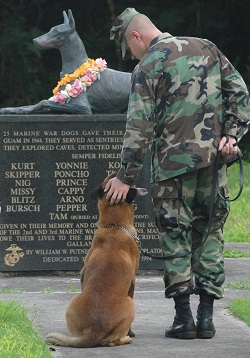A Historical Look at Military Service Animals: Part Two

Up until the 20th century, the use of service animals in the military had proven to be very effective. However, during World War I, horses were very ineffective against the enemy due to the use of barbed wire fences and machine guns. It has been estimated that at least six million military horses died in World War I. The use of horses as military service animals during WWI in conjunction with wars in other countries during the same time caused a severe depletion in the world horse population. As a result, horses were no longer used in military combat as of 1942 and many cavalry units were disbanded or mechanized.
Military Service Dogs
Although Europe, France, Poland, and other countries had been training and using military service dogs for years, the United States Army did not start using dogs until the 19th century for certain campaigns. Many military service dogs were used as mascots and companions. In 1942, the US military begun to train dogs to perform in a variety of roles, including police duty, reconnaissance patrols and to help find and save wounded soldiers.
Use of Military Animals After War
Initially following WWII, dogs were allowed to return to their owners. However, as military officials began to become more concerned about the effects of military life on dogs, they mandated that surviving dogs were to be euthanized or left behind at battle. This lead to the development of strong sentiment against the military in how it treated its military animals. Since many military personnel often befriend dogs, cats, and other animals while they are deployed overseas, both animal activists and vets who had survived the Vietnam War started to push for reform on this policy.
In 2000, former President Clinton passed a law allowing for inactive military dogs to be adopted instead of euthanized. Also, many of the animals that have died while in service to the military have been honored and recognized as war heroes, because they performed a multitude of heroic acts that saved the lives of many soldiers. While some dogs are still used in search and rescue and other types of military campaigns, they are no longer used in combat or on the front lines. The continued use of animals in the military still continues to draw the ire of animal activists everywhere.
Military Dogs on the Domestic Front
Although dogs were originally used on the battlefield, many of today’s service animals are specially trained to provide companionship and therapy for vets. Therapy trained military service animals and companion pets make it easier for vets to transition from active duty to civilian life. Many vets and military personnel often experience great personal challenges that make it harder for them to adjust to being back at home. These challenges could be due to a variety of issues including injury, emotional trauma, and personal experiences. The VA and other military affiliated health care organizations provide military service, companion, and therapy dogs to help vets and military personnel who are struggling to adjust to civilian life.
In the future, as the military continues to incorporate the use of service animals into its operations, more human and animal lives will be saved.
Related products you may like:
Testimonials:
-
I received my United States MA-1 Bravo Jacket yesterday and I am very pleased with it. Thanks
Charles W
-
Thank you very much for the two beautiful garments! Both the MA1-Bravo Jacket and the Concealed Carry Soft Shell Vest fit perfectly and are tailored to perfection. They are rugged and warm, exactly what I was looking for.
Ed J.
-
I received the jacket this past Wednesday. I just love it. Good quality, feels great, and looks sharp. I have been looking for such a jacket the past few years and have finally found it.
Edward A.
-
Dear Vetcom, Received the MA-1 Bravo Jacket yesterday. Thank you so very much, made a Veteran very happy. Was so hoping to have it on time for him to wear on Veterans Day and you made sure it was here in time. The jacket is beautiful and my husband just loves it. Again, thank you so very much and God bless.
Jessie H.






